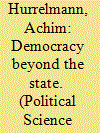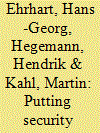|
|
|
Sort Order |
|
|
|
Items / Page
|
|
|
|
|
|
|
| Srl | Item |
| 1 |
ID:
130962


|
|
|
|
|
| Publication |
2014.
|
| Summary/Abstract |
MODERN DEMOCRACY IS, ABOVE ALL ELSE, a procedural ideal. To be sure, high substantive hopes are often placed in democracy. Yet the essence of democracy lies not in the specific outcomes that it may (or may not) help reach, but in a set of procedures that ensure, in the words of Philippe Schmitter and Terry Karl, that "rulers are held accountable for their actions in the public realm by citizens," who act primarily "through the competition and cooperation of their elected representatives."1 Historically, the main political arena in which democratic procedures have been implemented, and the main reference point for democratic theory, has been the state. According to a well-established argument, the democratization of non-state entities-such as international and supranational organizations or transnational networks with various degrees of institutionalization-is therefore faced with significant conceptual and practical challenges.2 This article seeks to assess the severity of these challenges: Can democratic procedures be transferred to political entities "beyond the state," or is democracy doomed to failure in non-state contexts?
|
|
|
|
|
|
|
|
|
|
|
|
|
|
|
|
| 2 |
ID:
128239


|
|
|
|
|
| Publication |
2014.
|
| Summary/Abstract |
Security governance has featured prominently in recent debates about fragmentation, informalization, and privatization in the increasingly diverse field of security policy. It has inspired much valuable research. Yet, there are not just very different conceptual understandings of security governance; there is also a lack of clarity regarding its empirical manifestations and normative connotations. After a decade of research, the special issue therefore puts security governance to the test and scrutinizes its analytical and political pitfalls and potentials. This editorial briefly reviews the rise of security governance, identifies central conceptual, empirical, and normative challenges that need to be addressed, and introduces the individual contributions to this special issue.
|
|
|
|
|
|
|
|
|
|
|
|
|
|
|
|
|
|
|
|
|